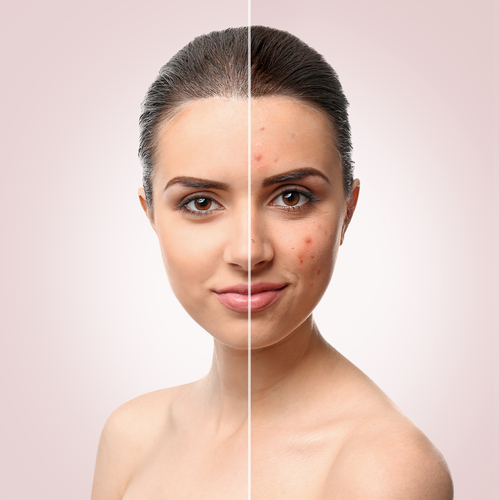As we have described in our blog in the past, acne is a very stubborn skin disease that has many different aspects to its origin and treatment. One common denominator is the effect of hormones on the production of oil or sebum within the skin pores.
These pore areas serve as the feeding ground for skin bacteria, and the development of pustules or pimples. The hormone with the most influence on the skin and its tendency to develop acne is testosterone.
Testosterone is obviously a major issue for young men. It creates more intense acne and deeper acne scarring in its aftermath.
Contrary to popular belief, testosterone is a major common issue in female acne as well. In fact, several recent studies have addressed how this phenomenon can be treated in teenage and older women.
It has been known for many years that a fairly weak blood pressure medication with a long chemical name, spironolactone, has anti-testosterone effects. In fact, when men take this medication to combat their high blood pressure, a common side effect is gynecomastia, or male breast enlargement.
 Based on this side effect, doctors perscribe spironolactone to blunt the effects of testosterone on female acne with good effectiveness. Several studies published in 2020 examined females 14 years old and older who were treated with a 100 mg dose for a trial of at least 3 months.
Based on this side effect, doctors perscribe spironolactone to blunt the effects of testosterone on female acne with good effectiveness. Several studies published in 2020 examined females 14 years old and older who were treated with a 100 mg dose for a trial of at least 3 months.
Within these studies, 80% of all patients treated showed improvement, including 73.4% of those with the most severe cystic acne type. Most of the responders had not reported improvement with topical therapy alone.
Side effects of spironolactone that were enough to stop therapy in these studies were small at 3.8%, and included rash, breast tenderness, diarrhea, and headache. Previous studies have shown that use of this medication combined with topical and laser therapy has also been beneficial compared to those treatments separately.
This research truly gives us additional options to treat even the most difficult acne without having to use the most potent, but frankly dangerous, treatment of Accutane in women. These findings will also allow skin care specialists (such as us) to reduce prescribing antibiotics with well known risks of resistance.
If you have further questions about acne or other skin care issues, please call us either at (207) 303-0125 in Scarborough, or (207) 873-2158 in Augusta. We can answer any pressing questions you may have, or schedule you for a free and individualized consultation.

